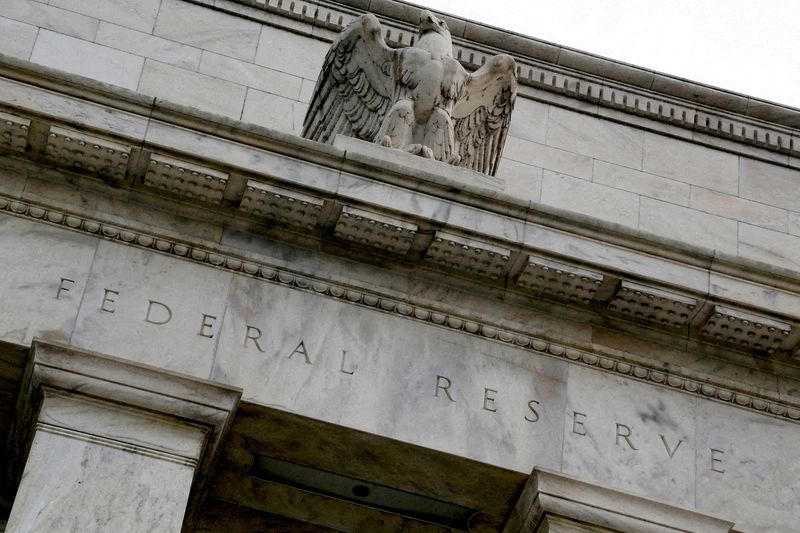LONDON (Reuters) – Global central banks must juggle the need to control inflation through higher interest rates and to calm markets unnerved by banking sector turmoil that has revived memories of the 2008 global financial crisis.
After the Federal Reserve on Wednesday delivered a modest 25 basis point rate hike, central banks in Switzerland, Norway and Britain all raised rates on Thursday.
Overall, 10 developed economies have raised rates by a combined 3,290 basis points (bp) in this cycle to date.
Japan is the holdout dove.
Here’s a look at where policymakers stand, from hawkish to dovish.
(Graphic: The race to raise rates – https://www.reuters.com/graphics/GLOBAL-MARKETS/lbvggjjagvq/chart.png)
1) UNITED STATES
The Fed raised rates by a quarter point on Wednesday, continuing its most aggressive series of hikes since the 1980s. It also calmed markets thrown in to turmoil by the collapse of U.S. lenders Silicon Valley Bank and Signature Bank and by UBS’ takeover of rival Credit Suisse.
After setting its policy rate to 4.75%-5.00%, the Fed hinted it may soon pause rate rises.
Chair Jerome Powell said there were “not weaknesses that are running broadly through the banking system.”
(Graphic: Fed delivers small rate hike – https://www.reuters.com/graphics/GLOBAL-MARKETS/zgpobajllvd/chart.png)
2) NEW ZEALAND
The Reserve Bank of New Zealand (RBNZ) has slowed its tightening pace, raising rates by 50 bps to a 14-year high of 4.75% in February.
Meeting minutes showed officials had considered a 75 bps hike. The RBNZ also held its peak rate forecast at 5.5%, saying that it was too early to assess policy implications from severe flooding in January.
(Graphic: New Zealand’s rate hikes – https://www.reuters.com/graphics/NEWZEALAND-ECONOMY/dwvkdkdggpm/chart.png)
3) CANADA
The Bank of Canada on March 8 became the first major central bank to halt monetary tightening during this cycle.
It held its key overnight interest rate at 4.50% with the aim to hold there as long as inflation drops to 3% at about mid-year.
(Graphic: Bank of Canada holds its key rate – https://www.reuters.com/graphics/CANADA-CENBANK/akveqeqzjvr/chart.png)
4) BRITAIN
The Bank of England raised rates by a further 25 bps on Thursday and said it expects the surge in British inflation to cool faster than before, despite a surprise jump announced on Wednesday.
It noted “large and volatile moves” in financial markets globally caused by the banking turmoil but said its Financial Policy Committee judged that Britain’s banking system remained resilient.
(Graphic: BoE’s inflation fight continues – https://www.reuters.com/graphics/BRITAIN-BOE/mopakwyzqpa/chart.png)
5) AUSTRALIA
Australia’s central bank raised its key rate by a quarter point to 3.6% in March, the highest since May 2012, but hinted rate hikes may be over for now.
Governor Philip Lowe has said monetary policy was “in restrictive territory” and said the bank’s board was ready to react if data supported a pause.
(Graphic: Taming inflation – https://www.reuters.com/graphics/GLOBAL-MARKETS/THEMES/lbpgglyzypq/chart.png)
6) NORWAY
Norway’s central bank hiked rates by 25 basis points to 3% on Thursday and signalled more would come.
The Norges Bank upped its rates forecasts and said it would likely hike rates again in May and also after that to hit 3.5% by the summer, given signs that economic slowdown will be less pronounced than previously expected.
(Graphic: Norway’s rate hiked – https://www.reuters.com/graphics/GLOBAL-CENTRALBANKS/movakwydyva/chart.png)
7) EURO ZONE
The ECB raised its deposit rate by another 50 bps to 3% on March 16, the highest since October 2008 and its sixth successive hike this cycle.
Investors see rates peaking at around 3.5%, despite concerns about the euro zone economy arising from tighter credit conditions as troubles at Credit Suisse and U.S. banks potentially make lenders more cautious.
“We have to tame inflation” in a “bold and decisive” manner, Bundesbank President Joachim Nagel, an influential hawk on the ECB’s governing council, said on Wednesday.
(Graphic: ECB sticks to big hike ECB sticks to big hike – https://www.reuters.com/graphics/GLOBAL-CENTRALBANKS/gdvzqkyzbpw/chart.png)
8) SWEDEN
The Riksbank raised rates by 50 bps in February to 3% and signalled more tightening is coming. Its next decision is on April 26.
Inflation was red-hot in February, with the underlying rate, stripping out volatile energy prices, jumping to 9.3%, the fastest pace since July 1991.
(Graphic: Further Riksbank hikes expected amid record inflation – https://www.reuters.com/graphics/GLOBAL-CENTRALBANKS/xmvjkbkogpr/chart.png)
9) SWITZERLAND
The Swiss National Bank raised its main interest rate by 50 basis points on Thursday to 1.5% and said UBS’s emergency takeover of Credit Suisse had “put a halt to the crisis”.
With inflation running at 3.4% in February, well above the above the SNB’s target band of 0% to 2%, the central bank chose to press on despite the banking turmoil with its fourth increase in a row.
The SNB also signalled that additional hikes could not be ruled out.
(Graphic: Swiss National Bank raises rates – https://www.reuters.com/graphics/CEN-WRAP/klpygqmjkpg/chart.png)
10) JAPAN
The Bank of Japan, the most dovish major central bank, maintained ultra-low interest rates at its March meeting, the final one for retiring BOJ governor Haruhiko Kuroda.
The BOJ resisted changing its yield curve control policy, which it uses to cap interest rates on longer-term debt. Investors expect Kuroda’s successor Kazuo Ueda to phase the programme out, maybe as soon as this year, as inflation exceeds the BOJ’s 2% target.
(Graphic: BOJ under fire – https://www.reuters.com/graphics/JAPAN-ECONOMY/BOJ/byvrlmxeyve/chart.png)
(Reporting by Yoruk Bahceli, Samuel Indyk, Nell Mackenzie, Dhara Ranasinghe, Alun John, Naomi Rovnick, Harry Robertson and Chiara Elisei; Graphics by Vincent Flasseur, Sumanta Sen and Pasit Kongkunakornkul and Riddhima Talwani; Editing by Barbara Lewis)

